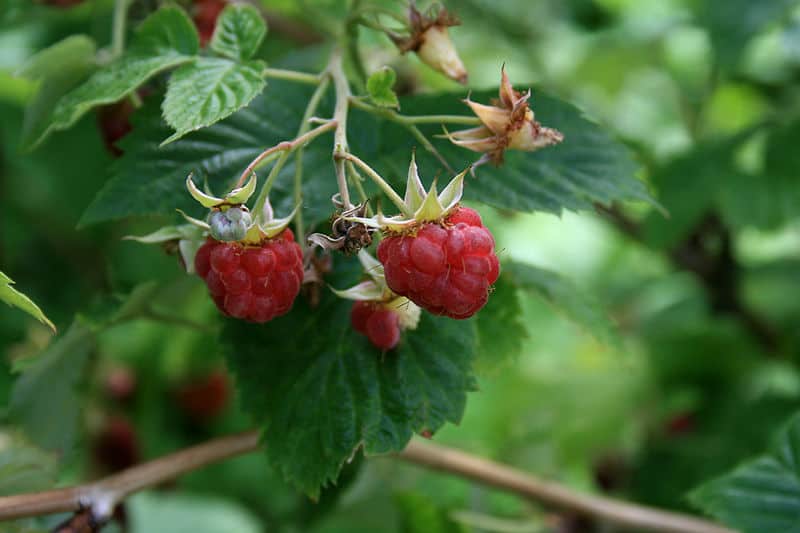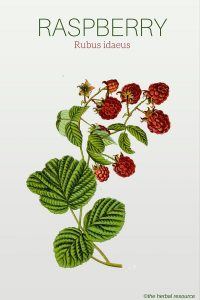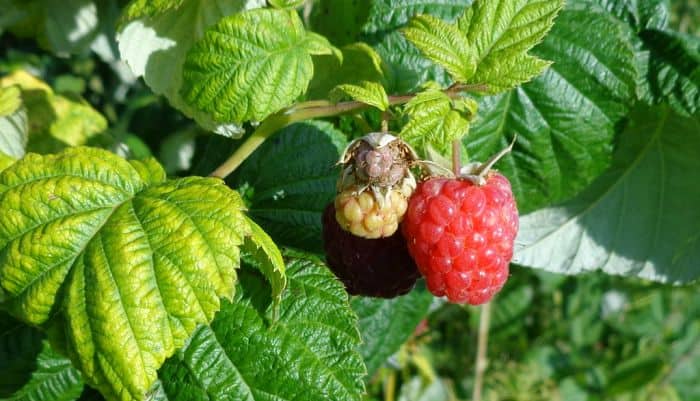Botanical Name: Rubus idaeus.
Other Common Names: Red raspberry, European red raspberry, wild raspberry, hallon (Swedish), hindbær (Danish), Himbeere (German), framboise (French).
Habitat: The plant is endemic to Europe and temperate parts of Asia, and has been naturalized in North America.
Description: Raspberry is in the rose family (Rosaceae). It is a 1 to 2 meters high half shrub with both annual and biennial shoots. The annual shoots are without branches and flowerless with dark red, brush-shaped thorns.
Every other year the shoots become branched and produce flowers. Leaves are green on top and silvery white on the underside. The flowers are white, erect with small petals and numerous stamens and pistils.
The fruit, a collection of many small berries, is red or (rarely) yellow.
Plant Parts Used: In herbal medicine, it is primarily the leaves that are used.
They are picked in the early summer from the annual shoots or of the fruit bearing shoots and then dried and crushed.
The berries are mostly used for culinary purposes but have also their uses as a medicinal herb.

Therapeutic Uses, Benefits and Claims of Raspberry
The leaves contain tannins, flavone glycosides, organic acids and vitamin C. The berries contain 1.5-2% organic acids, fructose, pectin, gum, anthocyanins, iron and vitamin C.
Raspberry has been cultivated for a long time and not only for its culinary uses but also for its medicinal properties. The fruit is rich in nutrients and may be helpful in preventing anemia.
In Chinese herbal medicine, the berries of Chinese raspberries (Rubus ideaus) have been used to strengthen the kidneys and as a treatment for incontinence.
There are many ways the berries can be applied as a medicinal herb and to fully exploit their high content of iron and vitamin C.
Both the dried and fresh leaves contain tannin that is known to have astringent properties. The leaves have therefore been used (usually as a tea) to treat diarrhea, heavy menstrual bleeding and vaginal discharge.
Additionally they have been used for menstrual cramps and as a remedy for fever, colds and flu.
Extracts from the leaves have been used externally for ulceration and inflammation of the mouth and throat, for tonsillitis, sore throat, varicose veins, burns and slow healing wounds.
A cooled and filtered decoction of raspberry leaves has been used as eye drops as a treatment for conjunctivitis.
Raspberry leaf tea has become a popular pre-birth treatment due to the relaxing, restorative and astringent effects of the herb. It seems particularly beneficial to the uterus in the last three months of pregnancy and during labor.
The astringent and stimulating effect helps to strengthen and tighten the muscles of the uterus and abdomen, while at the same time the relaxing and more soothing properties help the uterus to relax.
Laboratory experiments strongly indicate the raspberry leaf tea affects the uterus in a positive way, but the exact mechanism is still unknown so it is recommended that any intake of the tea during pregnancy should be done only under medical supervision.
The leaves may strengthen the mucous membranes throughout the body and have a positive effect on the digestive system.
The herb has also been used to alleviate morning sickness.
Dosage and Administration
Herbal tea can be made by letting a small handful of fresh or dried raspberry leaves simmer in half liter of water for a few minutes.
The tea should be allowed to cool down for 15 minutes and then strained. A cup of this tea can be taken two or three times daily.
Potential Side Effects and Interactions of Raspberry
There have been no reports of side effects when using the raspberry leaves in recommended dosages.
There are no known risks associated with the consumption of the berries.
Other Resources on Raspberry
Supporting References
Mindell, Earl: Earl Mindell’s Herb Bible. New York, Simon & Schuster / Fireside 1992.
Hobbs, Christopher: Herbal Remedies for Dummies. Foster City CA, IDG Books Worldwide 1998.
Foster, Steven: 101 medicinal herbs. Loveland, Interweave Press 1998.
Bown, Deni: The Royal Horticultural Society New Encyclopedia of Herbs & Their Uses. London, Dorling Kindersley 2002.
Barnes, Joanne; Linda A. Anderson & J. David Phillipson: Herbal Medicines. A guide for healthcare professionals. Second edition. London, Pharmaceutical Press 2002.
Thordur Sturluson
Latest posts by Thordur Sturluson (see all)
- What is the Difference Between Hemp and Marijuana? - June 3, 2019


It looks like it would be good for a senior citizen of any gender, too.